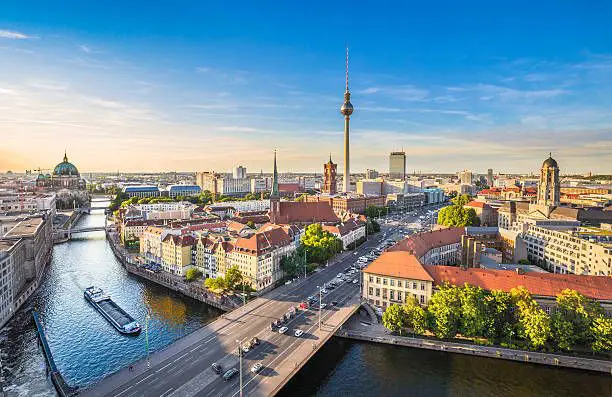Germany Digital Nomad Visa

The Germany Digital Nomad Visa is a new visa that allows digital nomads to live and work in Germany for up to one year. This visa is aimed at attracting remote workers and entrepreneurs to Germany to stimulate the country's economy.
It provides an opportunity for digital nomads to experience living and working in Germany while exploring the country's culture and travel opportunities.
One of the benefits of the Germany Digital Nomad Visa is that it allows digital nomads to legally live and work in Germany. This means that they can work for their clients or companies from anywhere in the world while being based in Germany. It also provides access to the German healthcare system, which is highly regarded globally.

Another advantage of the Germany Digital Nomad Visa is that it provides an opportunity for digital nomads to experience German culture and explore the country's many travel opportunities.
Germany is known for its rich history, beautiful architecture, delicious food, and diverse landscapes, ranging from the Bavarian Alps to the Baltic Sea coast.
However, it's important to note that the Germany Digital Nomad Visa does not provide a pathway to permanent residency or citizenship in Germany. It also doesn't allow the visa holder to work for a German employer or take up a freelance position in Germany.
Overall, the Germany Digital Nomad Visa provides a unique opportunity for digital nomads to experience living and working in Germany while exploring the country's rich culture and travel opportunities.
Eligibility Requirements For The Germany Digital Nomad Visa
To be eligible for the Germany Digital Nomad Visa, applicants must meet the following requirements:
1. Digital nomad status: Applicants must be able to prove that they work as digital nomads or remote workers, which means that they can work from anywhere in the world.
2. Nationality: Applicants must be nationals of countries outside the European Union (EU), European Economic Area (EEA), and Switzerland.
3. Minimum age: Applicants must be at least 18 years old.
4. Income requirement: Applicants must have a minimum annual income of €3,132, which is based on the 2021 German minimum wage. This can be proven through bank statements, tax returns, or a letter from the employer.
5. Health insurance: Applicants must have health insurance that covers them for the duration of their stay in Germany.
6. Clean criminal record: Applicants must provide a criminal background check from their home country or any country where they have lived for more than three months in the past five years.
7. Sufficient financial means: Applicants must provide proof of sufficient financial means to support themselves during their stay in Germany. This can be in the form of bank statements, proof of income, or a letter from the employer.
It's important to note that meeting these eligibility requirements does not guarantee that an applicant will be granted the Germany Digital Nomad Visa. The decision to issue a visa is at the discretion of the German embassy or consulate.
How to Apply For The Germany Digital Nomad Visa
To apply for the Germany Digital Nomad Visa, follow these steps:
1. Check eligibility: Ensure that you meet all the eligibility requirements for the Germany Digital Nomad Visa, including digital nomad status, nationality, minimum age, income requirement, health insurance, clean criminal record, and sufficient financial means.
2. Gather required documents: Collect all the necessary documents for your visa application, including your passport, proof of health insurance, criminal background check, proof of income, and proof of sufficient financial means. You may also need to provide additional documents depending on your specific circumstances.
3. Fill out the application form: Complete the visa application form at the German embassy or consulate in your home country. Make sure to provide accurate and complete information.
4. Pay the application fee: Pay the application fee for the Germany Digital Nomad Visa. The fee varies depending on the embassy or consulate and can be paid online or in-person.
5. Submit the application: Submit your application and all the required documents to the German embassy or consulate in your home country. You may need to schedule an appointment in advance.
6. Wait for a decision: Wait for the German embassy or consulate to process your application. This can take several weeks to several months, depending on the embassy or consulate.
7. Receive your visa: If your visa application is approved, you will receive your Germany Digital Nomad Visa. Make sure to check the visa details, including the validity period, and comply with all the visa conditions.
It's important to note that the Germany Digital Nomad Visa is a new type of visa, and the application process may change over time. Therefore, it's recommended to check the latest requirements and procedures before applying.
Benefits and Limitations of The Germany Digital Nomad Visa
The Germany Digital Nomad Visa offers several benefits for digital nomads who want to live and work in Germany, but it also has some limitations. Here are some of the benefits and limitations of the Germany Digital Nomad Visa:
Benefits:
1. Legal stay: The Germany Digital Nomad Visa allows digital nomads to legally stay in Germany for up to one year, which means they can live and work in Germany without fear of being deported or facing legal issues.
2. Access to healthcare: The visa provides access to the German healthcare system, which is highly regarded globally. This can give digital nomads peace of mind knowing that they can access quality healthcare if needed.
3. Cultural experience: Germany is a country rich in history, culture, and travel opportunities, and the visa provides digital nomads with a chance to experience it firsthand.
4. Flexibility: Digital nomads can work for clients or companies from anywhere in the world while being based in Germany. This means they can maintain their work-life balance and work on their own terms.
Limitations:
1. One-year validity: The Germany Digital Nomad Visa is valid for only one year, and it cannot be extended. This means digital nomads may need to apply for another visa or leave Germany after one year.
2. No path to permanent residency: The visa does not provide a pathway to permanent residency or citizenship in Germany. Therefore, digital nomads who want to stay in Germany long-term will need to explore other visa options.
3. Restricted work opportunities: The visa does not allow digital nomads to work for a German employer or take up a freelance position in Germany. This may limit job opportunities for some digital nomads.
4. Strict eligibility requirements: The visa has strict eligibility requirements, including a minimum income requirement, clean criminal record, and health insurance coverage. Not all digital nomads may meet these requirements.
Overall, the Germany Digital Nomad Visa provides digital nomads with an opportunity to experience living and working in Germany, but it's important to consider both the benefits and limitations before applying.
Cost and Processing Time of The Germany Digital Nomad Visa
The cost and processing time of the Germany Digital Nomad Visa can vary depending on several factors, including the embassy or consulate where the application is submitted, the applicant's nationality, and the completeness of the application. Here's an overview of the cost and processing time of the Germany Digital Nomad Visa:
Cost:
The cost of the Germany Digital Nomad Visa can vary depending on the embassy or consulate where the application is submitted. The fee can range from €50 to €100. The fee must be paid at the time of application and is non-refundable, even if the visa application is denied.
Processing time:
The processing time of the Germany Digital Nomad Visa can also vary depending on several factors. Generally, the processing time takes about four to six weeks, but it may take longer if additional information or documentation is required. Applicants are advised to apply as early as possible to avoid delays.
It's important to note that the processing time can be longer during peak travel seasons or if there are any administrative or technical issues at the embassy or consulate. Therefore, it's recommended to check the latest processing times and apply well in advance of your intended travel date.
In summary, the cost and processing time of the Germany Digital Nomad Visa can vary, but applicants should expect to pay a fee of €50 to €100 and wait four to six weeks for their visa application to be processed.
Health Insurance Requirements

Health insurance is a mandatory requirement for the Germany Digital Nomad Visa. Digital nomads must have valid health insurance coverage that meets certain minimum requirements in order to be eligible for the visa. Here are some important things to know about health insurance requirements for the Germany Digital Nomad Visa:
1. Minimum coverage: Digital nomads must have health insurance coverage that meets the minimum requirements set by the German government. This includes coverage for medical treatment, hospitalization, and repatriation in case of emergency. The coverage must be valid in Germany for the entire duration of the visa.
2. Type of insurance: The German government accepts both private and public health insurance plans as long as they meet the minimum coverage requirements. If you are covered under a private insurance plan, you must provide a certificate of coverage that outlines the details of your policy.
3. Proof of coverage: Digital nomads must provide proof of health insurance coverage at the time of application. This can be in the form of an insurance certificate, policy document, or confirmation letter from the insurance provider. The proof of coverage must be in English or German and should include the dates of coverage, coverage amounts, and policy details.
3. Exemptions: Digital nomads may be exempt from the health insurance requirement if they are covered under a public health insurance plan in an EU or EEA country, Switzerland, or a country with a social security agreement with Germany. In this case, they must provide proof of coverage from the relevant authority.
4. Travel insurance: While travel insurance may provide some coverage, it is not sufficient to meet the health insurance requirements for the Germany Digital Nomad Visa. Digital nomads must have valid health insurance coverage that meets the minimum requirements.
Overall, health insurance is a crucial requirement for the Germany Digital Nomad Visa, and digital nomads must ensure that they have valid coverage that meets the minimum requirements. It's important to check the latest health insurance requirements and guidelines before applying for the visa.
Taxes For Digital Nomads in Germany

If you are a digital nomad who is working remotely while residing in Germany, you may be subject to German taxes. Here are some things you should know:
1. Tax residency: If you have spent more than 183 days in Germany in a calendar year, you are considered a tax resident and are subject to German taxation on your worldwide income.
2. Taxable income: As a digital nomad, your taxable income will include any income you earn from sources in Germany, as well as any income you earn from abroad.
3. Tax rates: The tax rates in Germany vary depending on your income level. For example, if you earn up to €9,408 per year, you are not required to pay any income tax. If you earn between €9,409 and €57,051, you will be subject to a progressive tax rate that ranges from 14% to 42%. If you earn over €57,051, you will be subject to a flat tax rate of 42%.
4. Tax deductions: You may be able to deduct certain expenses from your taxable income, such as business expenses related to your remote work or certain relocation expenses.
5. VAT: If you are providing goods or services to customers in Germany, you may also be subject to Value Added Tax (VAT) regulations.
It is recommended that you consult with a tax professional who can provide you with tailored advice based on your individual circumstances.
Accommodation Options For Digital Nomads in Germany

Germany offers a variety of accommodation options for digital nomads, ranging from budget-friendly to luxury. Here are a few options:
1. Co-living spaces: Co-living spaces are becoming increasingly popular among digital nomads. They provide affordable accommodation in a community-oriented environment. Some co-living spaces in Germany include Digital Nomad Village in the Black Forest, Staytoo Apartments in Frankfurt, and The Fizz in Berlin.
2. Hostels: Hostels are a popular choice for budget-conscious digital nomads. They offer affordable accommodation with shared spaces for cooking, socializing, and working. Some popular hostels in Germany include A&O Hostels, Generator Hostels, and Meininger Hostels.
3. Airbnb: Airbnb is a popular option for short-term accommodation, offering a range of budget-friendly and luxury options. Many hosts offer discounts for long-term stays, making it a great option for digital nomads who want to stay for an extended period.
4. Apartment rentals: Renting an apartment is a popular choice for digital nomads who want more privacy and space. Many apartment rentals in Germany come fully furnished and offer amenities such as high-speed internet, making them a convenient option for remote work. Websites like Immobilienscout24 and WG-gesucht.de can help you find rental options in Germany.
5. Hotels: For those who prefer a more traditional hotel experience, there are many options available in Germany. Many hotels offer business-friendly amenities such as high-speed internet, meeting rooms, and coworking spaces. Some popular options include Motel One, NH Hotels, and Maritim Hotels.
It's important to research and compare different accommodation options to find the one that best fits your budget and needs as a digital nomad.
Internet and Telecommunication Options For Digital Nomads in Germany

Germany has a well-developed telecommunications infrastructure and offers various internet and telecommunication options for digital nomads. Here are some of the options available:
1. Mobile data plans: Germany has several mobile network operators, including Deutsche Telekom, Vodafone, and O2. They offer various mobile data plans, including prepaid and postpaid options, with different data allowances and speeds. These plans can be purchased from the respective operators' websites, mobile apps, or retail stores.
2. Wi-Fi hotspots: Wi-Fi hotspots are widely available in Germany, especially in cafes, restaurants, and coworking spaces. Many public places also offer free Wi-Fi, such as airports, train stations, and public parks.
3. Fixed-line internet: Fixed-line internet is widely available in Germany, with several internet service providers (ISPs) offering different plans with various speeds and data allowances. Some popular ISPs include Deutsche Telekom, Vodafone, and 1&1. You can check availability and compare plans on their websites or through comparison websites such as Check24 and Verivox.
4. Co-working spaces: Co-working spaces are an excellent option for digital nomads who require a reliable and fast internet connection. Many co-working spaces in Germany offer high-speed internet, meeting rooms, and other business amenities. Some popular co-working spaces include Betahaus, Mindspace, and The Drivery.
5. SIM cards for visitors: If you are visiting Germany for a short period, you can purchase a local SIM card with a prepaid data plan. These can be purchased from mobile network operator stores or at supermarkets, convenience stores, and kiosks.
It's recommended to compare the available options and choose the one that best suits your needs and budget as a digital nomad in Germany.
Co-working Spaces and Networking Opportunities in Germany

Germany has a thriving startup scene and is home to many co-working spaces and networking opportunities for digital nomads. Here are some of the options available:
1. Co-working spaces: Germany has many co-working spaces that cater to digital nomads and startups. These spaces offer various amenities such as high-speed internet, meeting rooms, events, and community-oriented environments. Some popular co-working spaces in Germany include Betahaus, Mindspace, The Drivery, and Factory Berlin.
2. Startup events and meetups: Germany has a vibrant startup community, and there are many events and meetups that provide networking opportunities for digital nomads. Some popular events and meetups include Startup Grind Berlin, Berlin Tech Meetup, and Munich Startups. You can find many more events and meetups on platforms such as Meetup.com and Eventbrite.
3. Industry-specific events: Germany is home to many industry-specific events and conferences that provide networking opportunities for digital nomads. Some popular events include CeBIT (IT and digital business), DMEXCO (digital marketing), and IFA (consumer electronics). Attending these events can help you connect with like-minded professionals and stay up-to-date with industry trends.
4. Online communities: There are many online communities and forums for digital nomads and startups in Germany. Some popular ones include Toytown Germany, Berlin Startup Jobs, and Reddit's /r/Germany. These communities can provide valuable insights and opportunities for networking with other professionals in the field.
5. Accelerators and incubators: Germany has several accelerators and incubators that provide resources and support for startups. Some popular ones include Rocket Internet, Techstars Berlin, and Berlin Startup Incubator. Joining an accelerator or incubator can provide you with access to mentorship, funding, and networking opportunities.
Overall, Germany has a vibrant startup and digital nomad community, with many opportunities for networking and collaboration. Attending events, joining online communities, and co-working spaces are all great ways to meet like-minded professionals and build your network.
Travel and Leisure Activities For Digital Nomads in Germany

Germany offers many travel and leisure activities for digital nomads to enjoy during their free time. Here are some popular options:
1. City exploration: Germany has many beautiful cities with rich histories and cultures. Some of the most popular cities include Berlin, Munich, Hamburg, and Cologne. You can explore historic landmarks, museums, and art galleries, or simply wander around the city's neighborhoods to get a sense of its vibe.
2. Outdoor activities: Germany has many beautiful natural landscapes, such as the Black Forest, Bavarian Alps, and the North Sea coast. Outdoor enthusiasts can enjoy activities such as hiking, skiing, cycling, and swimming in these scenic locations.
3. Beer gardens and festivals: Germany is known for its beer gardens and festivals, which are popular leisure activities for both locals and tourists. Some of the most popular festivals include Oktoberfest in Munich, the Karneval in Cologne, and the Christmas markets in various cities.
4. Food and drink experiences: Germany is famous for its cuisine, such as sausages, pretzels, and schnitzel, as well as its beer and wine. Digital nomads can explore local restaurants, breweries, and wineries to indulge in authentic German cuisine and drinks.
5. Wellness and relaxation: Germany has many spa towns, such as Baden-Baden, Wiesbaden, and Bad Homburg, where you can enjoy spa treatments, mineral baths, and relaxation activities. These towns are also surrounded by beautiful natural landscapes, providing a perfect escape from city life.
6. Cultural events: Germany has a rich cultural scene, with many events and festivals celebrating music, theater, and dance. Some popular events include the Berlin International Film Festival, the Bayreuth Festival, and the Schleswig-Holstein Music Festival.
Overall, Germany offers a diverse range of travel and leisure activities for digital nomads to enjoy during their free time. From exploring cities and natural landscapes to indulging in food and drink experiences and cultural events, there is something for everyone in this vibrant country.
Conclusion
In conclusion, the Germany Digital Nomad Visa is an excellent opportunity for remote workers to live and work in Germany legally. This visa allows digital nomads to stay in Germany for up to one year, with the possibility of extension. Applicants must meet certain criteria, such as having a stable income, health insurance, and accommodation in Germany.
Germany offers many benefits for digital nomads, such as a high standard of living, excellent healthcare, efficient transportation, and a thriving startup and tech scene. In addition, the country has a rich history and culture, with many travel and leisure activities to enjoy during free time.
Digital nomads who are interested in applying for the Germany Digital Nomad Visa should research the requirements and application process thoroughly and prepare all necessary documentation. Overall, the Germany Digital Nomad Visa is a great opportunity for remote workers to experience life in one of Europe's most dynamic countries.
